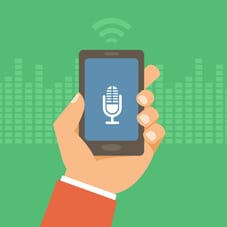The use of dictation has evolved as an active part of a productive law practice. In many cases, dictation tools are both easily available to a lawyer and completely intuitive as apps for smartphones or tablets. If you have shied away from today’s dictation technology, here are four good reasons to consider using it to operate more efficiently and improve billable hours — beyond simply dictating a memo, letter or brief.
1. Capture time and billing info promptly. While the practice of law has changed in many ways over the past few decades, the pain of time and billing recording has remained constant. The ease and immediacy of digital dictation tools can lessen that pain. You will bill and capture more time if you do it immediately after working on an assignment or leaving a meeting. As soon as a billable task is finished, pull out your smartphone and “tell” an app the time and billing information you need to record. That recording can be instantly sent to either an assistant or a time and billing program. This is particularly helpful when you are traveling or in court because it eliminates lag time — and you won’t need to spend the last few days of each month trying to remember every meeting and task for each client and matter!
2. Track and document expenses for reimbursement. Digital dictation can minimize much of the hassle of tracking and documenting expenses. For example, as soon as you leave a client lunch, take a quick snapshot of the receipt with your smartphone. Then make a voice recording of additional information, such as who attended the lunch and what topics were discussed. Attach the receipt to the voice file and transmit the file to yourself to input when back in the office, or send it to an assistant who can enter it for you.
3. Eliminate time spent typing documents. Rather than typing a document, dictate the substance into your smartphone. If necessary, send your file through a speech recognition program, which will convert it to text so you can review, edit and complete the document more quickly. (Some note-taking apps convert to text automatically.) Especially if you are a slow typist, dictation can speed the process of writing documents. And mobile dictation allows for better use of your time away from your computer, getting billable work out of what was once lost time.
4. Create more impactful reports. If you file reports that include images, dictation tools can help create more comprehensive reports, more quickly. Consider construction litigation attorneys, who need to visit job sites, or attorneys who need to investigate accidents on site. Historically, this involved scribbling notes on a yellow legal pad, snapping pictures with a camera, and then scrambling to create a coherent report from multiple pictures and pieces of paper. Today you can augment site work with smartphone pictures and notes dictated directly into your phone. You can send off those notes and photos as they are completed, and the work will be received nearly instantly back in the office by support staff. When you return to the office you’ll have saved significant time and effort.
With the right tools and processes, digital dictation technology can do far more than just traditional dictation.
Eric Wangler is the president of BigHand, a global provider of voice productivity technology. Eric has worked in the legal industry for more than 15 years, including years at Ricoh and IKON, and has been helping law firms around the world achieve excellence in operational and technology initiatives.
Illustration ©iStockPhoto.com
Subscribe to Attorney at Work
Get really good ideas every day: Subscribe to the Daily Dispatch and Weekly Wrap (it’s free). Follow us on Twitter @attnyatwork.
















